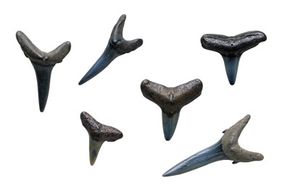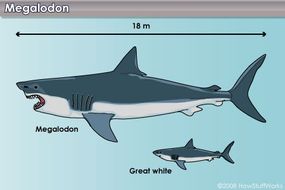Quck answer
Collecting shark teeth is a popular hobby for many people. Some do it for the thrill of finding a rare or unique tooth, while others simply enjoy the process of searching for them. Shark teeth can also be used for educational purposes, as they provide insight into the anatomy and behavior of sharks. Additionally, some people collect shark teeth for their aesthetic value, using them in jewelry or as decorative items. Overall, the reasons for collecting shark teeth vary, but it is a hobby that continues to attract enthusiasts around the world.
Wild Animals
The Significance of Shark Teeth: What Makes Them Unique?

Fossilized shark teeth
Siede Preis/Getty Images
For those unfamiliar with the practice of collecting shark teeth, it may come as a surprise to learn that these objects are not simply teeth, but fossils. Sharks have existed on Earth for roughly 400 million years. When a shark dies, its cartilage breaks down, and its teeth sink to the ocean floor where they are covered by sand and sediment. This sediment acts as a protective barrier that prevents oxygen and harmful bacteria from reaching the tooth, leading to fossilization over a period of around 10,000 years. This is why the majority of shark teeth that are found and collected are not white, but rather gray, black or brown, the color of the sediment. The minerals in the sediment are absorbed by the tooth, eventually replacing the dentine and enamel that make up the tooth. And just like that, you have a fossil.

The megalodon compared to a typical great white
HSW 2008
Like any other fossil, shark teeth can be valuable, and are therefore frequently exchanged, bought, and sold by enthusiasts and collectors. The most valuable teeth are those of the megalodon shark, a prehistoric beast that made the modern great white look like a regular goldfish. Today, great whites can range in size from 7 to 20 feet (2 to 6 meters), while the megalodon may have grown up to 60 feet (18 meters). Megalodon teeth range from 3.5 to 7 inches (89 to 177 mm) in length and can weigh more than a pound (.4 kg). Any megalodon tooth is a valuable find, and anything larger than 4 inches is considered rare and precious. These teeth can fetch several thousand dollars each on websites like eBay, depending on their size and the location where they were discovered. The value of the tooth is also determined by its condition. Although teeth are generally well-preserved as fossils, they may have sustained slight erosion, cracks, and chips from undersea rocks and coral.
Thus, one reason why individuals collect shark teeth is their monetary value. There are numerous websites dedicated to the sale of these collectibles. Another reason is that on any given hunt, collectors may find a tooth from a giant, prehistoric predator that is millions of years old. Most people would agree that discovering a fossilized shark tooth that weighs one pound and is as big as your hand is pretty cool. We will provide some tips on the best places and methods for finding these valuable fossils on the following page.
FAQ
1. What makes shark teeth so valuable to collectors?
Shark teeth are unique and fascinating objects that have been collected for centuries. Some people collect them for their beauty, while others are drawn to their historical or scientific value. Many collectors also enjoy the thrill of the hunt, scouring beaches and diving in search of these elusive treasures.
2. Are all shark teeth the same?
No, shark teeth come in a variety of shapes and sizes, depending on the species of shark. Some teeth are long and narrow, while others are short and wide. Some have serrated edges, while others are smooth. Collectors often specialize in certain types of teeth, such as megalodon or great white.
3. What is the rarest shark tooth?
The rarest shark tooth is the tooth of the megalodon, an extinct species of shark that lived millions of years ago. These teeth can be worth thousands of dollars, and are highly sought after by collectors. Other rare teeth include those of the great white shark and the tiger shark.
4. What are some common misconceptions about collecting shark teeth?
One common misconception is that collecting shark teeth harms the environment. In reality, most shark teeth are found on beaches or in shallow water, and collecting them has no impact on the shark population. Another misconception is that all shark teeth are sharp and dangerous, when in fact many are blunt and harmless.
5. How do you identify a shark tooth?
Shark teeth can be identified by their shape, size, and texture. Some teeth have unique characteristics, such as a distinct curve or a serrated edge. There are also many resources available online and in books to help identify different types of shark teeth.
6. What is the best way to clean and preserve shark teeth?
The best way to clean shark teeth is to soak them in a solution of hydrogen peroxide and water for several hours. This will remove any dirt or debris without damaging the tooth. To preserve the tooth, it should be stored in a dry, cool place away from direct sunlight.
7. Can you sell shark teeth?
Yes, shark teeth can be sold legally in most places. However, it is important to check the laws in your area to ensure that you are not breaking any regulations. Some rare or protected species of shark may be illegal to collect or sell.
8. Are there any dangers associated with collecting shark teeth?
Collecting shark teeth can be dangerous if you are not careful. It is important to watch out for sharp rocks or debris on the beach, and to be aware of your surroundings when diving. It is also important to respect the environment and not disturb any wildlife.
9. What is the largest shark tooth ever found?
The largest shark tooth ever found belonged to the megalodon, and measured over seven inches in length. This massive tooth is a prized possession for many collectors, and is extremely rare.
10. What is the most unusual shark tooth ever found?
There have been many unusual shark teeth found over the years, from teeth with multiple points to teeth that resemble other objects. One of the most unusual is a fossilized tooth that resembles a screw, which was found in the United Kingdom.
11. Can you collect shark teeth from a live shark?
No, it is not ethical or legal to collect shark teeth from a live shark. In addition to being harmful to the shark, it is also dangerous for the collector.
12. What is the appeal of collecting shark teeth?
For many people, collecting shark teeth is a way to connect with nature and learn about the history of these fascinating creatures. It is also a way to appreciate the beauty and intricacy of these unique objects, and to share that appreciation with others.





Leave a Reply